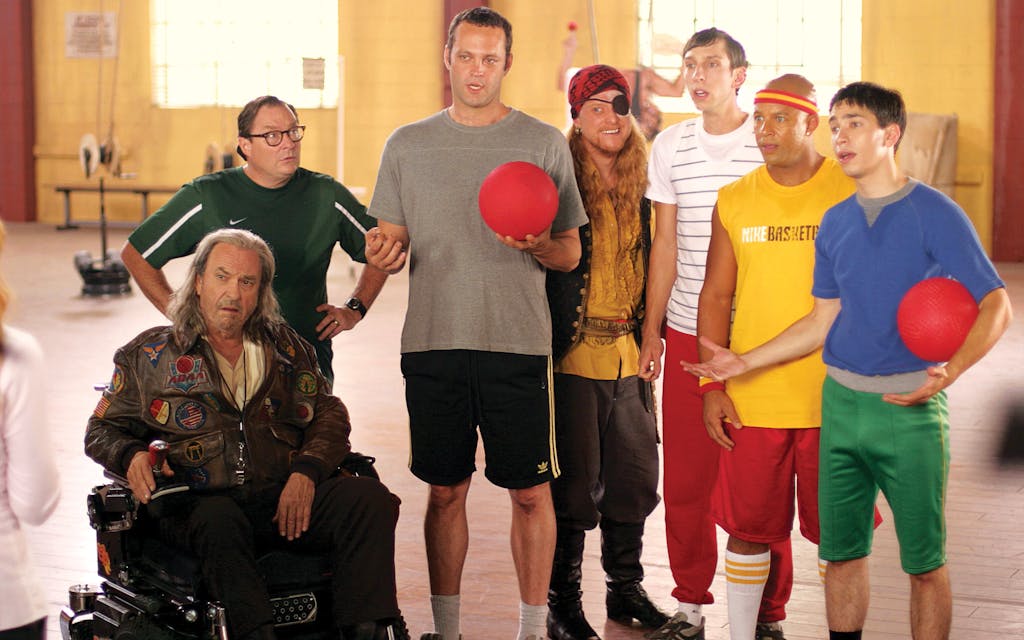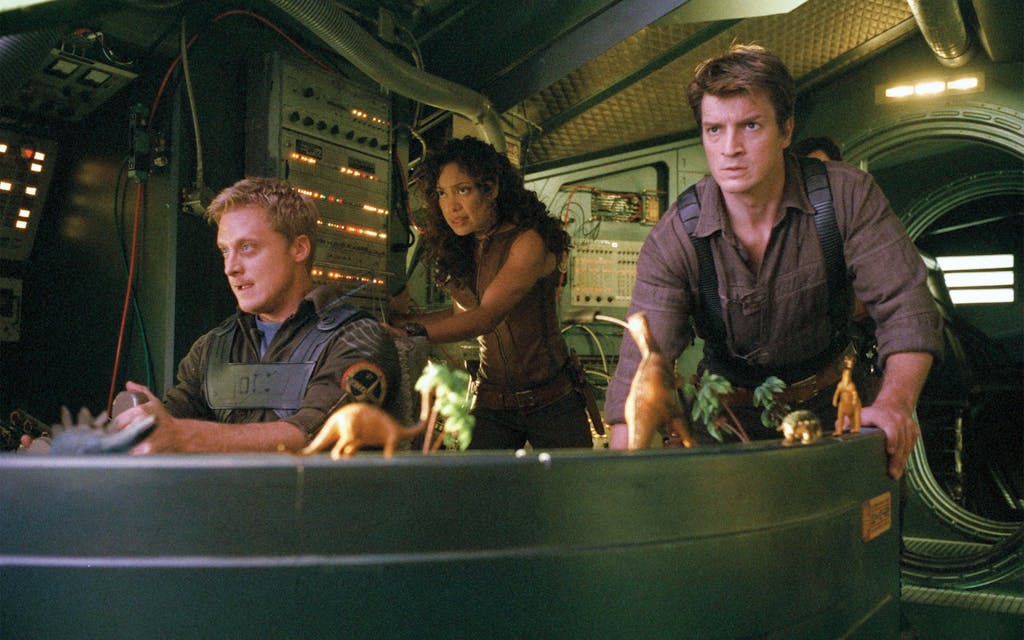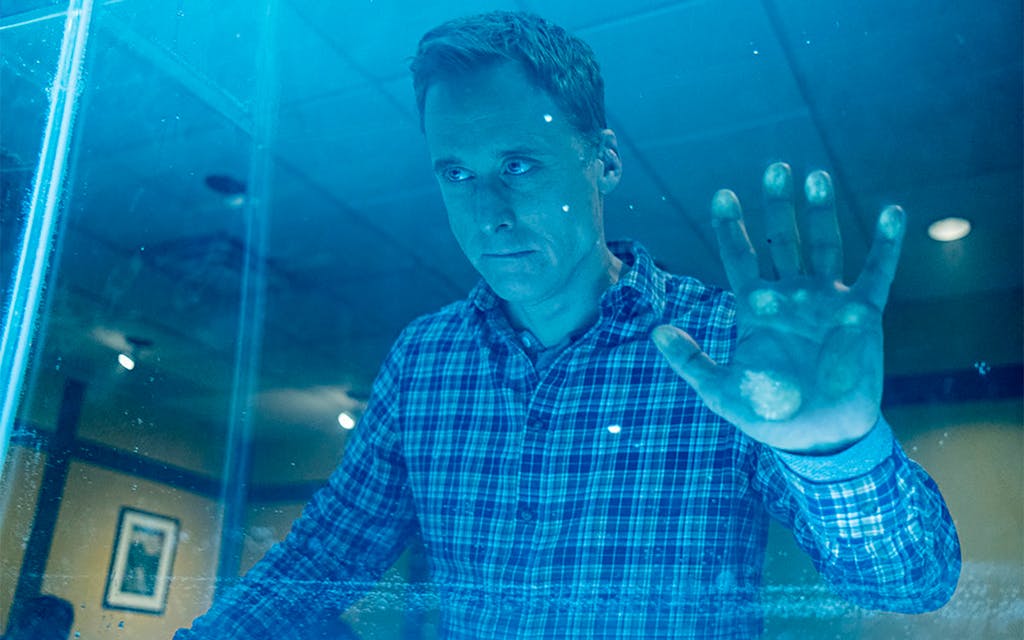You’ve probably seen Alan Tudyk play the sidekick to one of your favorite heroes. Maybe it was in 2001’s A Knight’s Tale, where he was a loyal squire to Heath Ledger’s jousting peasant. Maybe it was in 2004’s Dodgeball: A True Underdog Story, where he donned an eye patch and backed up Vince Vaughn and Ben Stiller as Steve the Pirate, or in 2011’s Transformers: Dark of the Moon, where he memorably broke the tension in a high-stakes interrogation scene. It might have been his iconic turn as pilot Hoban “Wash” Washburne in 2005’s Serenity—a film based on the cult classic TV series Firefly—where he served under the command of Nathan Fillion and Gina Torres. Or perhaps it was in Rogue One: A Star Wars Story, where he improvised a scene-stealing voice and motion-capture performance as the droll droid K-2SO. If you’re a Disney fan, you might have heard his voice in Raya and the Last Dragon, where he provided the voice of the titular character’s trusty steed, Tuk Tuk. Either way, you’ve probably seen him add comic relief (or, in the case of Dodgeball, comic absurdity) to a big movie star’s grand adventure. Those films alone grossed nearly $2.5 billion worldwide, even if Tudyk’s name never appeared on their posters.
There’s a reason Tudyk has been cast as a sidekick in so many successful projects: He’s great at it. The El Paso–born, Plano-bred actor, 50, has a jaw that’s just a little less square than that of a leading man like Fillion or Star Wars costar Diego Luna, and he’s got a deft sense of comedic timing. Those qualities— combined with his willingness to throw himself into the role of comic relief—make whichever hero he stands alongside look just a little more upright and valiant. Tudyk is as good at puncturing the high-stakes air of a rollicking space opera or fantasy epic as he is at being a human foil to the chiseled demigods in the center of the screen. He’s capable of stealing a scene and then graciously handing it back to whomever the audience wants to cheer for, and science fiction fans love him despite the fact that his characters are largely anonymous (his character on the current HBO Max hit Doom Patrol is literally named “Mr. Nobody”). Tudyk’s gift is for infusing his wingmen with an endearing balance of goofy everyman charm and genuine gravity, such that virtually all of his roles are somebody’s favorite character.

That’s what’s kept him working for more than two decades. Until this year, though, it hadn’t really brought him into a lead role. In late January, audiences got a glimpse of Tudyk with top billing, in SyFy’s surprise hit Resident Alien. In the series, an adaptation of a 2012 comic book series of the same title, Tudyk stars as Captain Hah Re, an alien whose nefarious plans toward Earth result in him crash-landing in a small Colorado town. Re assumes the form of the town doctor, Harry, and Tudyk spends the next ten episodes playing an alien who’s playing a human, providing medical forensic guidance to local authorities as they attempt to solve a murder. The part utilizes both sides of Tudyk’s repertoire: a deep exploration of, like, What It Means to Be Human, and also a lot of slapstick physical comedy. It’s not, in other words, the sort of role that you’d see Fillion or Luna take.
But that’s all right by Tudyk. He doesn’t seem to be compelled by a dream of being on a poster, swinging a light saber, or pointing a blaster. “The main good thing,” he says of finally being a lead, “is that you have more opportunity to play and craft something. It’s very fun to play a role that’s big and broad and can come in and steal a scene. You do half the work and people walk out of the theater remembering you for a funny line or a funny accent—but I like the opportunity to have more material to make something with.” If actors can be divided into those who are instinctive, natural performers, and those who are diligent students of the form, Tudyk is in the latter group.
“He’s all about building his performance from the ground up,” says Sara Tomko, who plays Tudyk’s character’s assistant on Resident Alien. She recalls being amazed as she watched Tudyk and the show’s writers and directors talk through how skilled his extraterrestrial hero would be at expressing emotions at various parts of his journey. “I’m all about just getting in there and being a little messy and figuring it out as we go. I was a little insecure about that, but Alan is a great mentor.”
That Tudyk is so intense and focused also means that—while he may have spent most of his career as the funny guy on-screen—talking with him about his work isn’t really a laugh-a-minute enterprise. Unlike many comedians, he’s not always dropping hilarious anecdotes or breaking out into funny voices. Rather, he spends a lot time contemplating the craft of comedic performance. Tudyk doesn’t recall comedy bits by laughing about his favorite gags so much as he wistfully admires a well-crafted joke, as though it’s something he’d want to hang in a museum. “I still remember things that I learned from Bugs Bunny,” he says. “When something makes me laugh hard, it just notches in my brain, and when I’m in a scene, the mechanics of the joke, and what makes the joke funny, come back up.” Tudyk has played a lot of sidekicks and comic relief, in other words, but he’s ready to be taken seriously.
When Alan Tudyk’s parents moved from El Paso to Plano in 1972, he was still a baby and Central Expressway was still a two-lane road. He quickly discovered a love of performing. As a junior high school student at Haggard Middle School, he took on a small part in a production of Studs Terkel’s Working at Plano Senior High, and was thrilled to learn that performing with the big kids got him access to watch rehearsals for the school’s production of Godspell. He found that he preferred comedy to drama, excelling in the humorous interpretation category at National Forensic League speech tournaments. This pleased his father, a businessman who ran a company that sold hydraulic seals for industrial use. “Is there a trophy?” he says, dropping into an impression of a proud North Texas dad in the eighties.
After high school, Tudyk decided to pursue acting, which led him to the now-defunct Lon Morris College in East Texas. The junior college, he says, had a good drama program, but was stronger on the technical side, and Tudyk didn’t find what he was looking for. He left without a degree after two years of acting classes and returned in 1991 to Dallas, where he took a job as a bartender at the Mexican restaurant Uncle Julio’s for a few years. On the side, he continued to pursue his passion by performing with the improv troupe Rubber Chicken, which he joined after responding to an ad in the Dallas Observer. Doing improv in Dallas is a tough way to transition to a full-time acting career, though, and, Tudyk wanted to get back to school. “I asked around at Pocket Sandwich Theater if anybody knew any good drama schools, and I heard that Juilliard was a good school,” he recalls. Figuring he could bartend anywhere, he prepared an audition with a two-minute contemporary comedy piece and a two-minute Shakespeare monologue (which he describes as “terrible”), and a song. He participated in a group audition in New York, earned a callback, and then improvised a piece for the program’s directors.
Tudyk is clearly proud of having worked his way from an East Texas junior college into one of the nation’s top drama schools. Nearly thirty years later, he can still reenact the improv bit that earned him his entrance into Juilliard. But he didn’t complete his education there, either—in 1995, he was cast in a workshop production of the play Bunny Bunny, by Saturday Night Live writer Alan Zweibel, and left Juilliard to take the role. The play was unusual: every character, outside of the two leads, was played by Tudyk, and when the play opened off-Broadway, the program listed his name more than twenty times. “It was a very generous setup,” he says, for a gimmicky role as “cameraman,” “French waiter,” “Big Bone Judy,” and two dozen more minor characters. The extra attention helped put him on Hollywood’s radar, and earned him his first audition, a small role in the 1998 Robin Williams dramedy Patch Adams.
The era was a boom time for dramedies, and Tudyk went on to other minor parts as a rehab patient alongside Sandra Bullock in 28 Days, and backing up Michael Douglas in Wonder Boys. A Knight’s Tale came around that time, and then Tudyk landed the role that would help define his career as Wash, the Hawaiian-shirt-wearing starship pilot on Joss Whedon’s short-lived cult classic Firefly. The role helped pivot Tudyk into the sci-fi/fantasy canon, where he quickly found a comfortable home, sidekicking his way through endless adventures.

The sort of comfy home you get as a fan-favorite sci-fi actor can also be restrictive, though. In 2015, Tudyk created a web series, Con Man, to explore the golden handcuffs that come with being in that spot. He wrote, directed, produced, and starred in the series—his only lead role prior to Resident Alien, even if he had to make it himself, with $3 million in funding he raised via an IndieGoGo campaign. In the series, which ran two seasons’ worth of fifteen-minute episodes and premiered on the YouTube competitor Vimeo, he plays a long-suffering artiste with more than a passing resemblance to Tudyk himself: his character, Wray Nereley, had found his audience playing the sidekick on a short-lived cult sci-fi space opera series, but secretly longed to work with Clint Eastwood, Wes Anderson, or the Coen brothers, while paying the bills by making appearances at fan conventions. (Fillion, a close friend, also produced and costarred, playing the show-within-a-show’s leading man.) The primary difference between himself and the character he played in Con Man? “I don’t dislike the sci-fi community,” he says.
Still, it’s clear that the similarities between Tudyk and Wray Nerely aren’t just coincidence. Tudyk’s creative itches don’t seem fully scratched by informing a broad-shouldered captain that the shields are at 40 percent. When I ask him if genre work offers him the opportunities he craves as a performer, he’s circumspect. “I’m definitely happy with what I get to do,” he says. “But I’m an actor—I always want to do more. I would like to one day play a boring person.” When I compare Resident Alien, a murder mystery set in a snow-covered small town, to FX’s Fargo, he gets wistful. “Fargo, I love Fargo. Those are actors,” he says. “It’s not just attractive people on camera.” He doesn’t exactly sound jealous when he says it, but he’s clearly given a lot of thought to the nature of the business he’s in. “Attractiveness does a lot of work,” he says. “If you’re attractive, you don’t have to do anything.”
Tudyk has had plenty of opportunity to think about the way Hollywood works over the course of his quarter century in the business. He’ll be fifty in March, just as Resident Alien winds down its first season. Chris Sheridan, the creator and showrunner for the series, says he thinks Tudyk is probably content with where his career has taken him. “He’s been around for so long, and he’s so well-known and well-liked,” Sheridan says. “He doesn’t strike me as someone who’s bemoaning the fact that he’s not the lead on a TV show. He’s an actor’s actor, and I think he likes that.”
Playing the hero might not be what’s motivated Tudyk all these years, but he’s nonetheless frank when I ask him if he prefers getting top billing. “I wish it wasn’t better,” he says. “I wish I could say, ‘Being a wingman is great, being a lead isn’t all it’s cracked up to be.’ But there’s a lot of good things about it.” It’s not necessarily fame or attention that gets his fire going, but being the star provides some real benefits, even to an “actor’s actor.” Tudyk is able to dive into his character with Sheridan, going through the script and giving notes, asking questions, being more involved in the creative process. “If you’re fifth on the call sheet,” Tudyk says, “you don’t get that opportunity.”
Learning that firsthand is unusual for an actor at Tudyk’s stage of career—but so is a lot of his journey. There aren’t a lot of actors who went from Lon Morris College to Juilliard to Star Wars, after all. If Resident Alien is the start of a new phase of his career in which the next crop of sidekicks are backing him up, he’ll find something interesting to do in the center of the frame. But even if offers of leading roles don’t pour in, Tudyk has learned enough at this point to have an idea of how to forge his own path.
“I feel like I’m a late bloomer,” Tudyk says. “I always have been, in a lot of different ways. I didn’t go to New York until I was in my twenties. Most people at Juilliard are eighteen when they get there. I didn’t write or direct until I was in my forties. It’s nice—if I do get frustrated, I’ll just make the thing I want to do.”
- More About:
- Film & TV
- Theater
- Television
- Plano
- El Paso









